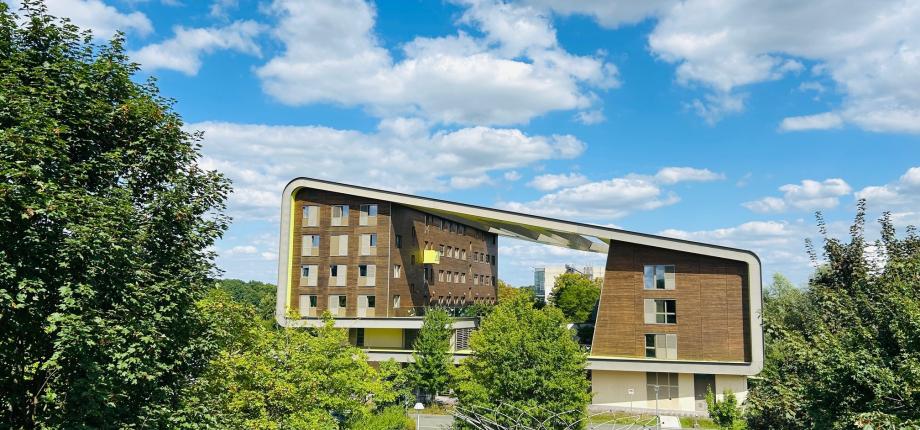The laboratories
CEREA - Atmospheric Environment Education and Research Center
Themes: air quality, pollution dispersal and transportation, atmospheric modeling on an urban and regional scale, data assimilation.
CEREA is committed to an ambitious scientific policy to tackle the challenges of modeling the atmospheric environment. CEREA’s research activities contribute to the understanding and quantification of the impact of transportation on air quality, together with the interactions between atmosphere and energy, including atmosphere/city energy exchanges, renewable energy, and pollutant dispersal in industrial and urban built environments.
Director: Patrick Massin - Deputy: Mac Bocquet
Oversight: École nationale des ponts et chaussées, EDF R&D
CERMICS - Research Center in Mathematics and Scientific Computing
Themes: applied mathematics, sciences computing, modeling, optimization.
CERMICS is an École nationale des ponts et chaussées laboratory, hosting shared project teams with INRIA and Université Gustave Eiffel. CERMICS is a member of the Fédération Bézout. The research activity of the center covers a wide range of topics in applied mathematics. Its key feature is the study of models with deterministic and stochastic aspects, using both theoretical and numerical approaches.
Director : Gabriel Stoltz – Deputy: Julien Reygner
Oversight: École nationale des ponts et chaussées, CNRS
CIRED - International Environment and Development Research Center
Themes: development and environmental economics, energy/waste/transportation/water/food issues, global environmental challenges, precautionary principle, modeling.
The objective of CIRED’s policy is to study how to connect environment, resources, and development, in particular for strategic domains such as energy, urban infrastructures, and agricultural activities. The laboratory applies this question at world, country, or territorial scale. It tackles crosscutting issues of sustainable development such as fairness, competitiveness or growth, and explores how societies tackle these issues through the notion of decision-making in contexts of controversy. Research activities develop through a policy of alliances and partnerships in both the national and international communities. The approach to them is broadly multidisciplinary, ranging from engineering sciences to social sciences, using digital prospective models as integrators.
Director: Philippe Quirion
Oversight: École nationale des ponts et chaussées, AgroParistech, EHESS, CIRAD, CNRS (UMR 8568)
HM&CO – Hydrology Meteorology and Complexity
Themes: multiscale observation and analysis, system based modeling, management of water as risk and resource, quantity and quality, hydrology for a resilient city.
The Hydrology Meteorology and Complexity Laboratory develops multi-scale analysis, multi-scale observations and complex systems approach to modelling. Its research aims to better understand and represent urban basins, with a focus on urban resilience.
Director: Ioulia Tchiguirinskaia
LATTS - Technologies, Territories, and Societies Laboratory
Themes: social sciences, spatial planning, history, dialogue between social sciences and technology and engineering, in both private sector companies and the public sector. Two major domains tackled: productive organizations and territorial organizations.
LATTS is a multidisciplinary social science laboratory specializing in the issues of the city, territories, space, and production, today and in the past. It seeks to understand how technical production molds each of these worlds, and how technical developments contribute to their transformation.
Founded to study the city and its networks, as well as companies and their production models, LATTS maintains a dialogue between the social sciences and the worlds of technology. At the intersection of several overlapping disciplines (spatial planning, geography, history, political science, sociology…), it seeks to contribute to public debate by taking the view that big economic and societal changes – energy transition, digital revolution – deserve to be elucidated by an effort to understand the technical infrastructures that underpin them.
Director: Jonathan Rutherford
Overshight: CNRS, École nationale des ponts et chaussées et Université Gustave Eiffel.
LEESU - Water, Environment, and Urban Systems Laboratory
Themes: Water, soil and sustainable cities - Uses and innovations - Hydrosystems and society
LEESU’s domain is the analysis of the impact of global changes (climate, urban design and architecture, regulations, practices, usages, management notes) on flows of water and contaminants in the urban milieu, from rainfall through to its destiny in the reception milieu. LEESU research is targeted and engaged.Its activities are anchored in lasting operational partnerships with local authorities in the Paris region and with industries in the water sector. Its ambition in the next 5 years is to develop innovative concepts for sustainable water management in a resilient city, founded in fields of expertise developed in the last 10 years: modeling and the use of models, micro-pollutants and pathogens in human-impacted catchment basins, multiscale approaches, limnology, urban water uses, and urban planning. The approach is interdisciplinary, a balance between observations in situ and/or in controlled lab conditions, and their interpretation, culminating in quantitative and predictive models.
Director: Ghassan Chebbo - Deputy: Julie Gobert
Oversight: École nationale des ponts et chaussées, UPEC
LHSV - Saint-Venant Hydraulics Laboratory
Themes: fluid mechanics applied to hydraulics and the environment (rivers, coasts, and harbors).
The laboratory conducts R&D activities in the field of fluid mechanics applied to water systems and the environment. The applications of the research relate to river type free surface hydraulics in internal, maritime, and coastal waters, as well as harbors. The Laboratory develops knowledge, methods, and tools on waves and flows from the regional scale (ocean, catchment basin) to the local scale for the interactions between water flows and engineering structures.
Director: Sebastien Boyaval - Deputy: Sebastien Bourban
Oversight: École nationale des ponts et chaussées, EDF R&D
LIGM - Gaspard Monge Computer Science Laboratory
Themes: algorithms and architectures for image analysis and synthesis; algebraic combinatorics and symbolic computation; software, networks and real time; models and algorithms; signal and communication.
The laboratory covers a wide spectrum of computer sciences and their interactions, from algorithms and discrete models, software, networks, and real-time systems, to imaging, statistical signal processing, and digital communications. The focus of scientific policy is to choose, consolidate, or develop research orientations.
Director: Walid Hachem - Assistant Director for École nationale des ponts et chaussées: David Picard
Oversight: École nationale des ponts et chaussées, Université Gustave Eiffel, CNRS (UMR 8049)
LMD - Dynamic Meteorology Laboratory
Themes: atmospheric dynamics, study of climate and its interannual fluctuations, continental and global scales.
The laboratory studies climate, air quality, and changes in planetary atmospheres, through a combination of theoretical approaches, instrumental innovations, collection of observations, analysis of data, in particular satellite data, conceptual developments, and numerical modeling. It is at the cutting edge of research on dynamic and physical processes.
Director: Freddy Bouchet
Oversight: ENS, École Polytechnique, Sorbonne Université, CNRS (UMR 8539) - Partner: École nationale des ponts et chaussées
LVMT - City, Mobility, Transportation Laboratory
Themes: analysis and modeling of interactions between transportation and spatial planning.
LVMT’s scientific purpose is to understand and model the interactions between mobility practices, transportation infrastructures, land use, and spatial planning. This object is studied in its “reality”, often on the basis of real cases, through the quest for patterns and regularities, and through cooperation between a wide range of disciplines: anthropology and sociology, geography and spatial planning, sociopolitical, socio-economic, and techno-economic approaches, mathematical modeling and computer science.
Director: Anne Aguiléra – Deputy directors: Nicolas Coulombel, Florent Le Nechet, Laurent Terral
Oversight: École nationale des ponts et chaussées, Université Gustave Eiffel
Navier Laboratory
Themes: basic research on the mechanics and physics of materials and structures, and their applications to geotechnics, civil engineering, geophysics, and the oil industry.
Laboratoire Navier’s scientific activity focuses on five themes: Innovative construction materials and structures, safety and durability of structures, transportation infrastructures, underground storage, Environment. The energy transition demands better design of the materials, structures, and infrastructures used in construction and civil engineering.
Laboratoire NAVIER develops basic research on the mechanics and physics of materials, structures, and geomaterials, and their applications to geotechnics, civil engineering, geophysics, and the oil industry.
Director: Jean-Michel Pereira - Deputy directors: Adélaïde Ferraille, Olivier Pitois
Oversight: École nationale des ponts et chaussées, Université Gustave Eiffel, CNRS (UMR8205)
PjSE - Paris-Jourdan Economics Laboratory
Themes: general economics research laboratory, with broad coverage of the discipline. A worldwide reputation for excellence, more specifically in theoretical economics, public economics, and labor market economics.
PjSE’s aspiration is to advance the frontiers of knowledge through both fundamental and applied research, with a particular focus on the analysis and evaluation of public and macroeconomic policies. Its methods are drawn from mathematical modeling and/or econometric analysis. The unit produces numerous original databases in economic history, public economics or development economics.
Director: Jean-Marc Tallon - Deputy: Oliver Vanden Eynde
Oversight: École nationale des ponts et chaussées, EHESS, ENS, INRAE, CNRS, (UMR8545), Université Paris 1 Panthéon-Sorbonne

